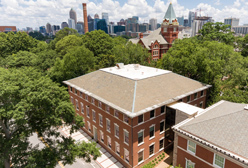Recent Books by Faculty
Animating Space: From Mickey to WALL-E (University Press of Kentucky) by J. P. Telotte, Professor and Chair, School of Literature, Communication, and Culture. Focusing on American animation by Walt Disney Company, Warner Bros, and Pixar Studios, Telotte explores the contributions of those who invented animation, those who refined it, and those who, in the current digital age, are using it to redefine the possibilities of cinema.
Bram Stoker (University of Wales Press) by Carol Senf, Professor and Associate Chair, School of Literature, Communication, and Culture. Part of the series Gothic Writers: Critical Revisions, Senf traces Gothic patterns, images and themes throughout Bram Stoker's significant body of fiction demonstrating how Stoker developed a deeper sense of the Gothic as a means of social commentary.
No Man’s Land: Globalization, Territory, and Clandestine Groups in Southeast Asia (Cornell University Press) by Justin Hastings, Assistant Professor, The Sam Nunn School of International Affairs. Hastings examines the complex relationship that clandestine groups have with modern technology—and how and when geography still matters.
Philosophy of Science: 5 Questions (Automatic Press/VIP ) edited by Robert Rosenberger, Assistant Professor, School of Public Policy. A part of the5 Questions Series,which is based on short interviews with influential and prominent scholars of philosophy, Rosenberger’s collection illuminates the aim, the scope, the future direction of research, and how the subjects’ works fit in these respects.
Practicing Science Fiction: Critical Essays on Writing, Reading and Teaching the Genre (McFarland) edited by Karen Hellekson, Craig B. Jacobsen, Patrick B. Sharp, and Lisa Yaszek, Associate Professor, School of Literature, Communication, and Culture. Drawn from the 2008 Science Fiction Research Association conference held in Lawrence, Kansas. LCC postdoctoral fellow, Rebekah Sheldon, authored a chapter.
Recognizing States: International Society and the Establishment of New States Since 1776 (Oxford University Press) by Mikulas Fabry, Assistant Professor, The Sam Nunn School of International Affairs. Recognition of new states is the practice historically employed to regulate membership in international society. Though demands for statehood often drive major conflicts and international controversies, Fabry is the first to apply systematic scholarship to the criteria for acknowledgment of new states.
The Cambridge Companion to Dewey (Cambridge University Press) edited by Molly Cochran, Associate Professor, The Sam Nunn School of International Affairs. Part of the prestigious Cambridge Companions to Philosophy series, Cochran's book encompasses the wide range of Dewey’s prolific writings on metaphysics, philosophy of mind, cognitive science, psychology, moral philosophy, the philosophies of religion, art, and education, and democratic political and international theory.
The Road to War: Congress' Historic Abdication of Responsibility (Praeger Security International) by Robert Kennedy, Professor, The Sam Nunn School of International Affairs. Kennedy discusses why U.S. congressional power on issues of war and peace has diminished over time and the abdication of responsibility that resulted in the current war with Iraq.
The Theory and Practice of Innovation Policy: An International Research Handbook (Edward Elgar Publishing), edited by Ruud E. Smits, Utrecht University; Stefan Kuhlmann, University of Twente; and Philip Shapira, Professor at the University of Manchester, and the School of Public Policy. A joint project from 24 prominent scholars in the field, this comprehensive handbook explores the interactions between the practice, policy, and theory of innovation.
Yearbook of Nanotechnology in Society Volume II: The Challenges of Equity, Equality, and Development (Springer) co-edited by Susan Cozzens, Professor, School of Public Policy, and Jameson Wetmore. Major technological shifts always co-evolve with social relationships. This book focuses on how nanotechnologies might affect equity/equality in global society.
What Does Georgia Tech Think?
Selected Press for Ivan Allen College of Liberal Arts
|
Peterson Highlights Growth of Liberal Arts at Tech
"What comes to mind when you think of Georgia Tech? ... Regardless of what you already know, there are some things about Tech that may surprise you. The fastest-growing college at Georgia Tech is the Ivan Allen College of Liberal Arts," wrote President G. P. "Bud" Peterson in an article "Georgia Tech a creative force for Midtown" Source: Atlanta Business Chronicle - December 10
Levine Study Shows That States Now Fund Majority of Human Embryonic Stem Cell Research
“While the federal government still contributes more to stem cell research overall, each year since 2007 these six states have funded more human embryonic stem cell research than the federal government,” said Aaron Levine, assistant professor in the School of Public Policy. Levine created an online searchable database that allows users to find detailed information about each grant given out by the six states that adopted programs specifically to fund stem cell research. The database currently covers grants given out by California, Connecticut, Illinois, Maryland, New Jersey and New York from December 2005 to December 2009, and will be updated yearly with new information. Read full article in the Nature Biotechnology - December 7
"The list of national security challenges facing America today is daunting... Not one of these challenges can be effectively addressed by the United States alone. Each of these challenges requires that we work with Russia. Yet the linchpin for our strategic cooperation with Russia — the New START Treaty — is at risk," wrote Sam Nunn, Distinguished Professor in The Sam Nunn School of International Affairs, former U.S. senator from Georgia, and co-chairman of the Nuclear Threat Initiative. Source: Atlanta Journal Constitution - December 6, 2010
Walsh Survey of U.S. - Japan Innovators In Financial Times
"There are other ways that Japan should make fuller use of its research talent," says Sadao Nagaoka of the Institute of Innovation Research at Hitotsubashi University, Tokyo, who last year published the results of a survey of more than 5,000 Japanese and US inventors that he conducted with John Walsh [School of Public Policy] of the Georgia Institute of Technology. The survey found that far fewer inventions in Japan came from people working in very small companies than was the case in the US, where spin-offs and start-ups have played a central role in the extraordinary flowering of innovation experienced in particular in areas such as Silicon Valley." Source: Financial Times - December 8, 2010
Ries Says: Eliminate Income Tax, Create More Jobs
Economics Professor Christine Ries applauds the Georgia Department of Economic Developments success in bringing many companies to the state but says a more powerful, direct, and widely effective way to attract busines and encourage growth and expansion of companies already here is to cut taxes. Eight states have already eliminated state income taxes - two are Georgia neighbors. Read the full text of Ries' guest column as it appeared in the Atlanta Journal Constitution - December 5
Video Games May Be the Future of Journalism Says Bogost
Digital Media Professor Ian Bogost, School of Literature, Communication, and Culture, wrote that, "At the Georgia Institute of Technology's Digital Media Program, we are researching newsgames, the application of games to journalism. Newsgames reinvent journalistic principles through their design, using current events, infographics, puzzles, community action and more. But they offer a truly new way for journalism to contribute to civic life by amplifying the how instead of the who."
Read the full article as it appeared in the New Scientist - November 18, 2010
LCC Students Design Fiction ‘Techstyle’
'Techstyle' magazine, was created by Digital Media graduate students Lauren Langley, Don Fernandez, and Laurie Marion as a project for Professor Carl DiSalvo's Visual Culture and Design class. "This fake nano-fashion magazine, complete with parody ads, runway shots and model interviews, ought to beguile the fans of interactive wearables," writes Bruce Sterling on his blog for Wired. Langley wrote, “As a design team, we decided to draw from nanotechnology research to create a science fiction concept product. We thought that creating an interactive, online magazine would be a unique way to incorporate several products into one comprehensive digital artifact." Read full article in the Wired blog - December 14
|
Sam Nunn to Receive Inaugural Ivan Allen Jr. Prize for Social Courage
|
|
One of the nation’s most respected and visionary leaders
on defense and national security – former United States Senator Sam Nunn – has
been named the inaugural recipient of the Ivan Allen Jr. Prize for Social
Courage, Georgia Institute of Technology President G.P. “Bud” Peterson
announced today. Nunn will be honored at the Ivan Allen College’s Founder’s Day
luncheon on March 15, an
event that coincides with Allen’s birthday.
“While some individuals talk about achieving world peace, Sam Nunn has actively
pursued this vision and created a legacy that continues to reap results long
after his exit from public office,” said Peterson. “The
Ivan Allen Prize for Social Courage stands as the preeminent award offered by
Georgia Tech and underscores the mission we have in Georgia, the nation and the
world.”
During his
24-year tenure as a United States Senator from Georgia, Nunn served as chairman
of the Senate Armed Services Committee. In this capacity, he was the guiding
force in reshaping American policy toward the former Soviet
Union in the wake of the break-up of the Soviet Empire. The
Nunn-Lugar Cooperative Threat Reduction Program, which provides assistance to Russia
and the former Soviet republics for securing and destroying their excess
nuclear, biological and chemical weapons, has been hailed as “the most
significant congressional achievement in nuclear affairs since the dawn of the
nuclear age.”
Announced earlier
this year, the new Ivan Allen Jr. Prize for Social
Courage was established to recognize individuals like Nunn, who, by
standing up for clear moral principles in the social arena, have positively
affected public discourse at the risk of their own careers, livelihoods and
even their lives. The Ivan Allen Jr. Prize for Social
Courage will be accompanied by a $100,000 award to be funded by the income from
a $2 million commitment made in 2008 by the Wilbur and Hilda Glenn Family
Foundation.
“Sam Nunn embodies the moral and ethical principles of
Atlanta’s former mayor and it is certainly fitting that he will be the first
recipient of this distinguished award,” said Jacqueline Jones Royster, dean of Georgia Tech’s Ivan Allen College of
Liberal Arts.
Although Nunn
retired from the U.S. Senate in 1996, he has continued to provide leadership
against the dangers of terrorism and nuclear weapons. Together with fellow
Georgian and CNN founder Ted Turner, he established the Nuclear Threat
Initiative (NTI), a non-profit, nonpartisan organization that focuses on
reducing global threats from weapons of mass destruction. Next year, NTI will be celebrating its 10th anniversary,
having made significant achievements with a lasting legacy to make the world a
safer place.
NTI
triggered significant
U.S. and global funding for securing loose nuclear bomb-making material through its bold
initiative to remove vulnerable materials from Yugoslavia. The organization also
conceived of and helped create the first international organization focused on
nuclear security, the World Institute for Nuclear Security. Most recently, NTI,
through the generosity of Warren Buffett, supported the development of an
international nuclear fuel bank, which gives countries an alternative to producing their own nuclear fuel
and avoiding the introduction of technology that can be used either for
peaceful reactors or for creating bombs.
In an effort
to galvanize global support for and action on the vision of a world free of
nuclear weapons and the urgent steps needed to reach that goal, Nunn joined former
Secretary of State George P. Shultz, former Defense Secretary William J. Perry and
former Secretary of State Henry A. Kissinger. Their Wall Street Journal op-ed in 2007 reframed the terms of the global
debate on nuclear issues.
Nunn serves as
chairman of the board of the Center for Strategic and International Studies in Washington,
D.C. In addition to his work with NTI and CSIS, Nunn is also co-chair of the
Euro-Atlantic Security Initiative (EASI), an international commission sponsored
by the Carnegie Endowment for International Peace, aimed at identifying the
challenges and opportunities for strengthening cooperation in Euro-Atlantic
security.
In addition,
Nunn serves as a distinguished professor in Georgia Tech’s Sam Nunn School of
International Affairs. He received an
honorary Doctor of Philosophy from Georgia Tech in 2008 and was the recipient
of the Ivan Allen Jr. Prize for Progress and Service in 2004. |
Evaluating the Impact of Federal Science Investments Policy: Cozzens and Hicks Present at White House Conference
The federal government's huge investment in science and technology is giving rise to new research that evaluates the impact of nationally-funded R&D programs. Two Georgia Tech public policy professors are leading researchers in the field and presented this month at a White House conference on the subject.
In September, U.S. House of Representatives Research and Science Education Subcommittee Chairman, Daniel Lipinski said, "Given the magnitude of the federal investment in science and technology, there is a need for objective analysis and evaluation of federally funded R&D programs. And given the size of the budget deficit, Congressional decision makers need the best information possible to make sure we are spending taxpayer dollars optimally."
Lipinski's remarks highlighted the science of science policy (SoSP), an emerging field of interdisciplinary research that is promoted by the White House Office of Science and Technology's SoSp initiative and receives funding from the National Science Foundation. Associate Dean of Research and Public Policy Professor Susan Cozzens, and Professor and Chair of the School of Public Policy Diana Hicks are leading researchers in the field, which is providing a scientifically rigorous basis from which policy makers and researchers can assess the impacts of the nation's scientific and engineering enterprise, improve their understanding of its dynamics, and assess likely outcomes.
.jpg)
Cozzens and Hicks were invited presenters at the White House Office of Science and Technology’s (OSTP) Workshop on the Science of Science Measurement December 2-3, which included researchers from Harvard, MIT Sloan School of Management, and the University of Michigan. The workshop was sponsored by the OSTP’s National Science and Technology Council (NSTC), a Cabinet-level Council chaired by President Obama that is charged with establishing “clear national goals for Federal science and technology investments in a broad array of areas that span virtually all the mission areas of the executive branch.” Its scientific committee included members of key federal policy and research funding groups including National Institute of Standards and Technology, the National Institute of Health, Department of Defense, the National Science Foundation, the Environmental Protection Agency, BEA, and the Department of Education.
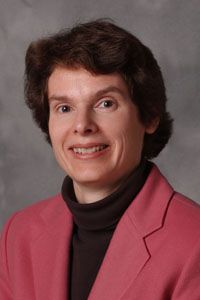
Cozzens and Michele Snoeck (Universidad de la Republica, Uruguay) presented "Knowledge to Policy: Contributing to the Measurement of Social, Health, and Environmental Benefits ". Hicks presented "Systemic data infrastructure for innovation policy " during the segment focused on Technology Development and Deployment.
The workshop was intended to “create a dialogue between the Federal science and technology (S&T) agencies and the research community about relevant models, tools, and data that advance scientific measurement in key areas of national S&T interest: economic benefits; social, health and environmental benefits; S&T workforce development; and technology development and deployment. Secondly, the workshop was to identify a joint Science of Science Policy research agenda for the Federal S&T agencies and the research community.
Read more about the workshop and watch videos at http://www.nsf.gov/sbe/sosp/
SoSP Roadmap
Top Photo: Susan Cozzens
Bottom Photo: Diana Hicks
|
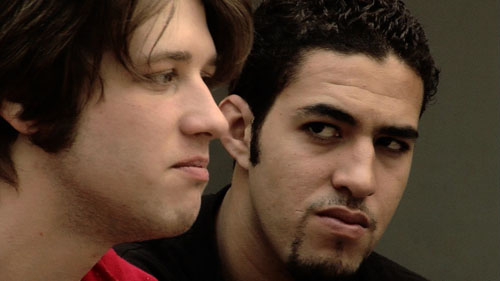
|
From Georgia Tech to Casablanca: American and Muslims Students Cross Borders for a Post-9/11 Encounter
How many of us have engaged open discussion on the sensitive relations between between American and Muslim cultures? American and Muslim Georgia Tech students and Muslim students in Casablanca, Morocco came together recently for just such an encounter.
The catalyst for these encounters was the post-9/11 documentary “Crossing Borders” brought to campus November 8 by the School of Modern Languages. The film follows four American and four Moroccan university students who travel together across Morocco, where the dominant religion is Sunni Muslim. The journey uncovers cultural stereotypes and opens pathways to dissolving those barriers. Filmmaker Arnd Wächter hoped that the interactions he captured on film would create opportunities for intercultural empathy among American and Muslim student audiences. The Georgia Tech audience responded strongly.
“More than 160 students and faculty turned out for this event and they were very moved by the film,” observed Philip McKnight, Chair of the School of Modern Languages. “The film ended at 7:30pm and ninety percent of the audience remained for a quite lively discussion that went on until 10:15.”
Among them were students Anita Hosni and Ahsan Dharnai, who are studying Arabic, observed that most of the audience were taken aback by how quickly, and how well the eight students [in the film] got along. “There are quite a few clashes on screen, but, surprisingly, most occur between students from the same culture,” they said. “Of particular interest is the special bond developed between Rochd of Morocco and David of America [shown in the photo, above] - two of the most outspoken individuals in the film. Their relationship provided a majority of the laughs, and also sheds new light on how two people from such disparate lands can be so similar.”
Rajaa Aquil, Assistant Professor, Director of the Arabic Languages for Business and Technology Program and a native speaker of Arabic, helped organize the event said, “Students had a lot of questions about Arabs and Islam, women, and other controversial issues that are usually raised, and often times wrongly represented by the western media."
The intense interest among the students prompted arrangement of a further discussion via Skype between Georgia Tech students of Arabic who conversed with students from Hasan University in Casablanca, Morocco.
“Arnd was quite amazing in leading the students in both dialogs. They were very cautious at first,” said McKnight. “But at the end of the conversation, these students decided they wanted to exchange email and Facebook addresses.”
As special focus of McKnight’s outreach for the event were Georgia Tech ROTC students, many of whom attended. The event was funded by the ROTC Language and Culture Project (Project GO, an Institute of International Education grant). Discussion was anchored by a panel that included Wächter; Tech Alumnus Kyle Jessop, who was in the Peace Corps in Africa; Aquil, and Larry Rubin, Assistant Professor from the Sam Nunn School of International Affairs whose research and teaching foci include Islam and politics and international security.
Rubin said, “Personally, I found one of Arnd's comments very interesting with regards to building meaningful relationships across cultures. He said, if I remember correctly, that the honest disagreements/arguments are extremely necessary to forge lasting bonds. It was noted that people tend to avoid political or controversial subjects in some cultures (like the US). I think this is something that many students could identify with.”
The two encounters are powerful examples of the path-breaking intercultural and applied language experiences that the College engages for Georgia Tech students through curricula, the International House student living community, the Languages for Business and Technology and other work/study abroad programs. Such experiences develop lifetime skills that are vital for graduates who will negotiate the social, technological and political contexts of other cultures in a global, interdependent, and multicultural community.
Aquil and Rubin are traveling to Egypt and Jordan, respectively, to arrange Georgia Tech student internships programs.
The School of Modern Languages plans future showings of Crossing Borders. Wächter is touring Crossing Borders in universities around the world.
Photo: David and Rochd, two of the eight students whose journey together was documented in "Crossing Borders". Their outspokeness created a majority of the laughs along the journey. The photos was provided by Crossing Borders.
Read more and offer feedback about the Crossing Borders Education Intercultural Awareness Initiative (IAI) and the documentary at http://cb-education.org/
School of Modern Languages
Project Go
|
Economics Welcomes Three Visiting Professors
Three new visiting faculty members complement the research foci of the School of Economics, which includes Development Economics, Environmental Economics, Industrial Organization, and International Trade.
 Associate Professor, Wolf Gick, was most recently a visiting scholar in the Center for European Studies at Harvard University. Prior to that appointment, he was a visiting associate professor in the Department of Economics at Dartmouth College where he received the campus-wide “Profiles in Excellence” teaching award. Gick, hailing from Germany, earned a PhD in Economics from the University of Innsbruck, Austria. His research interests are industrial organization, game theory, and contract theory with applications to patent disclosure, platform markets, strategic information transmission, health care gatekeepers, and vertical or delegated contracting organizations. Associate Professor, Wolf Gick, was most recently a visiting scholar in the Center for European Studies at Harvard University. Prior to that appointment, he was a visiting associate professor in the Department of Economics at Dartmouth College where he received the campus-wide “Profiles in Excellence” teaching award. Gick, hailing from Germany, earned a PhD in Economics from the University of Innsbruck, Austria. His research interests are industrial organization, game theory, and contract theory with applications to patent disclosure, platform markets, strategic information transmission, health care gatekeepers, and vertical or delegated contracting organizations.
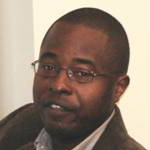 Professor Jonathan Kakeu will soon receive his PhD in Economics from the Université de Montréal, Canada. His research interests include environment and natural resources, industrial organization, applied econometrics, and asset pricing. Kakeu, from The Republic of Cameroon, is a former economists and statistician for the Cameroon Department of Economic Forecasts and Department of Higher Education. Professor Jonathan Kakeu will soon receive his PhD in Economics from the Université de Montréal, Canada. His research interests include environment and natural resources, industrial organization, applied econometrics, and asset pricing. Kakeu, from The Republic of Cameroon, is a former economists and statistician for the Cameroon Department of Economic Forecasts and Department of Higher Education.
 Assistant Professor, Levent Kutlu, recently received his PhD in Economics and M.Stat in Statistics from Rice University. His research interests include applied econometrics, applied microeconomics, and industrial organization. His specific interests are dynamic games, productivity analysis, market power analysis, and price discrimination. A native of Turkey, Kutlu has a special interest in programming and has most recently focused this interest on the programming language Matlab. Assistant Professor, Levent Kutlu, recently received his PhD in Economics and M.Stat in Statistics from Rice University. His research interests include applied econometrics, applied microeconomics, and industrial organization. His specific interests are dynamic games, productivity analysis, market power analysis, and price discrimination. A native of Turkey, Kutlu has a special interest in programming and has most recently focused this interest on the programming language Matlab.
Read more at www.econ.gatech.edu/faculty
|
In Brief
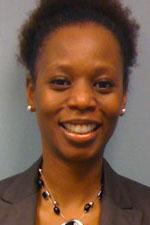 Ladipo joins Office of Government and Community Relations Ladipo joins Office of Government and Community Relations
School of Public Policy MS graduate, Fatimot Ladipo, returns to Georgia Tech as Assistant Director of Federal Relations in the Office of Government and Community Relations. Most recently, Ladipo served as a legislative and media liaison for the Georgia Student Finance Commission. Prior to that, she worked at the U.S. Congressional Budget Office and at the Department of Commerce. In her new position, Ladipo will work with Georgia Tech Director of Federal Relations, Robert Knotts, assisting in providing strategic counsel to campus administrators and in implementing the Institute's federal strategies. Ladipo will be based in Georgia Tech's Washington, D.C. office.
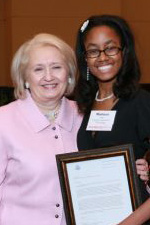 Lee wins Georgia Pacific Scholarship Lee wins Georgia Pacific Scholarship
Madison Lee, a sophomore in the International Affairs and Modern Languages (IAML) program has been awarded the $5,000 Georgia Pacific Scholarship. The award was announced during the Global Women's Initiative Symposium luncheon on November 11. Lee won the award on the basis of her essay on the topic of human rights and how the United States can improve the quality of life for women in countries with turbulent political climates, while maintaining the delicate balance of diplomacy. As a potential solution to the problem, Lee emphasized increased funding of non-governmental organizations that work closely with communities in need of aid and support.
Photo: U.S. Ambassador Melanne Verveer (left), Madison Lee (right)
|
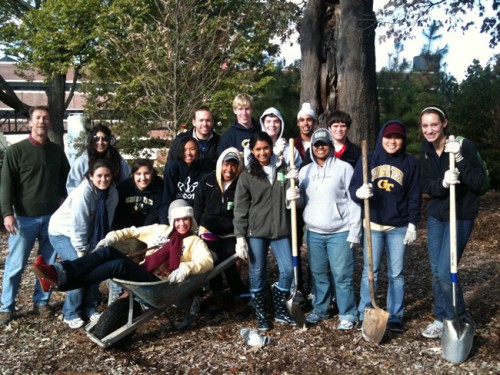
|
This Month's Banner Photo
Students in the School of Literature, Communication, and Culture Honors 1102 class dug in deep this month to plant 75 trees on campus. The project resulted from Georgia Tech's new designation as a Tree Campus USA. The trees were donated through a grant from the National Arbor Day Foundation and Toyota. The class is writing a field manual of the flora and fauna of Georgia Tech's campus. Honors 1102 is taught by Associate Professor Hugh Crawford who will receive the Board of Regents of the Board of Regents’ Award for Excellence in Teaching this Spring.
|
|

